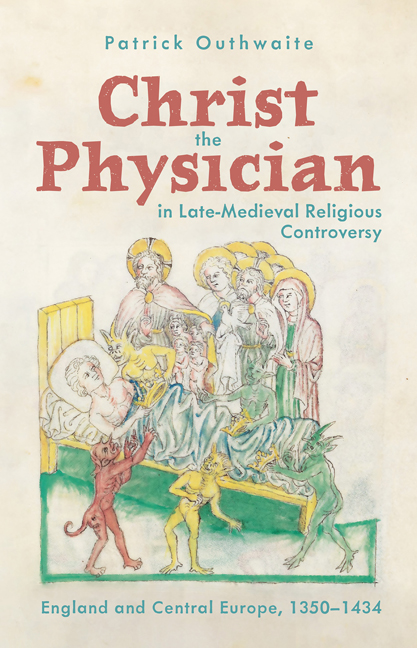Book contents
- Frontmatter
- Dedication
- Contents
- List of Illustrations
- Acknowledgements
- List of Abbreviations
- Introduction: The Christus medicus Tradition
- 1 The Virgin Mary as Nurse, Medicine and Mother: Devotional Texts and Hospitals
- 2 Sacramental Medicine and Frequent Communion from Prague to Kraków
- 3 Disenfranchised Surgeons: Christus chirurgus and Wycliffite Preaching in England
- 4 The Diseased Ecclesia from Jan Hus’s Exile to the Council of Basel
- 5 Responses to Heresy at the Councils of Constance and Basel
- Afterword
- Bibliography
- Index
- Miscellaneous Endmatter
1 - The Virgin Mary as Nurse, Medicine and Mother: Devotional Texts and Hospitals
Published online by Cambridge University Press: 09 May 2024
- Frontmatter
- Dedication
- Contents
- List of Illustrations
- Acknowledgements
- List of Abbreviations
- Introduction: The Christus medicus Tradition
- 1 The Virgin Mary as Nurse, Medicine and Mother: Devotional Texts and Hospitals
- 2 Sacramental Medicine and Frequent Communion from Prague to Kraków
- 3 Disenfranchised Surgeons: Christus chirurgus and Wycliffite Preaching in England
- 4 The Diseased Ecclesia from Jan Hus’s Exile to the Council of Basel
- 5 Responses to Heresy at the Councils of Constance and Basel
- Afterword
- Bibliography
- Index
- Miscellaneous Endmatter
Summary
In late medieval Europe, a new type of hospital based on a charitable mission within society became prominent. As already outlined, these hospitals were often governed by apostolic principles that focused on healing a cross-section of the population, including those that were not explicitly ill, such as orphaned children, the poor and elderly. The growth in popularity of these institutions constituted a part of what André Vauchez has termed ‘une véritable révolution de la charité’, which led the clergy to involve themselves more heavily in secular society. There was also a shift in attitudes towards the sick poor. While the poor and ill were somewhat stigmatised – especially when some were suspicious that beggars were able bodied and thus undeserving of assistance – Adam J. Davis has demonstrated that there was a change of ‘collective attitudes’ in which poverty and illness were increasingly regarded as signs of divine election. This was particularly the case in the tradition of the pauperes Christi, the poor of Christ, which, according to theologians such as Jacques de Vitry, included the involuntary poor, hungry, leprous, those with disabilities and those who were sorrowful. This change in attitude encouraged the foundations of an increased number of hospitals for the sick poor, with their mission of caring for the pauperes Christi.
The staff of hospitals for the sick poor adopted a charitable and faith-based approach to care. Nun-nurses or canoness-nurses stayed in residence to assist in medical procedures, wash bed sheets and oversee all aspects of their patients’ convalescence or palliative care. Hospitals for the sick poor were not organised around the treatments of physicians, but rather the daily care provided by nurses. Where some hospitals had physicians as members of staff, the majority would only hire a physician when they had a patient that required specialist treatment. Nevertheless, the outbreak of plague called for more specialist treatment, and consequently some nurses were required to take on more medical responsibilities and care for an increased number of patients.
Alongside the increased need for medical care was an equal need for spiritual treatment, and again nurses were called upon. Michael Leahy has referred to this joint effort of spiritual and physical care as constituting an ‘institutional imaginary’ that governed both religious and medical institutions of the late medieval period.
- Type
- Chapter
- Information
- Christ the Physician in Late-Medieval Religious ControversyEngland and Central Europe, 1350-1434, pp. 27 - 66Publisher: Boydell & BrewerPrint publication year: 2024



